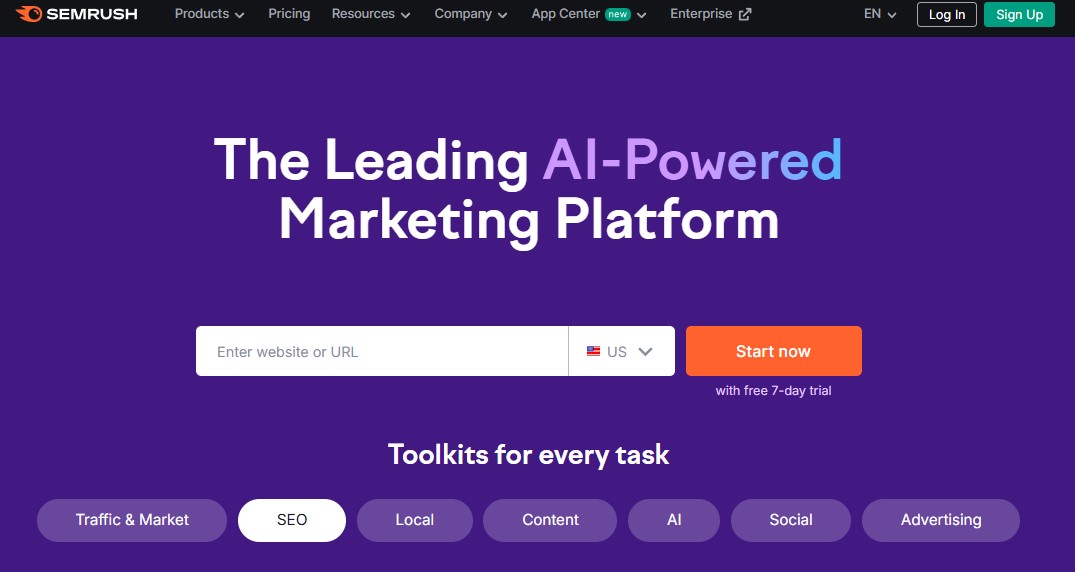August 12, 2025
Discover the Best Keyword Search Tool for Your Needs

Greg Kopyltsov
Founder
best keyword search tool


Finding the ideal keywords is crucial for effective digital marketing and search engine optimization. A strategic approach to keyword research can significantly impact your ability to connect with your target audience. Utilizing the right keyword tool not only streamlines the discovery of high search volume terms but also unveils related keywords that enhance your content's visibility. By leveraging valuable data and insights from various keyword research tools, content creators can formulate strategies that resonate with search intent and lead to successful online presence.

Several options stand out in the realm of keyword research tools, catering to diverse needs. Each tool offers unique features that enhance keyword analysis, such as search volume insights and competition levels. From SEMrush's all-in-one SEO capabilities to AnswerThePublic's focus on content ideation, the best keyword search tools help content creators and business owners optimize their search campaigns effectively. Assessing factors like ease of use, data accuracy, and pricing can guide users in selecting the right fit for their specific requirements.
A comprehensive suite of tools, Semrush stands out as an all-in-one SEO powerhouse that caters to various keyword research needs. Offering insights into search volume, competition level, and keyword suggestions, it empowers content creators and business owners alike. Users benefit from its keyword analysis capabilities, enabling them to uncover new keywords and track search trends. With a user-friendly interface, Semrush makes it easy to optimize content and advertising campaigns, helping you achieve your SEO goals effectively while providing valuable data at every turn.
Ahrefs stands out as a premier tool for keyword research, offering exceptional competitor insights that fuel effective SEO strategies. Its robust keyword analysis features allow users to uncover related keywords and niche opportunities, enhancing organic search visibility. Monthly search volume data helps identify the right keywords for targeting specific audiences. With user-friendly interfaces and extensive backlink analysis, Ahrefs equips content creators and business owners with the valuable data needed for successful advertising campaigns. This tool is a go-to choice for anyone keen on optimizing their content marketing efforts.
This tool stands out as an essential resource for anyone looking to optimize their advertising campaigns. With its ability to generate keyword ideas based on search volume and competition level, it empowers users to refine their keyword list effectively. The Google Keyword Planner is especially advantageous for a Google Ads account, providing valuable insights into monthly search volume and related keywords. Its ease of use makes it a go-to option for businesses and content creators seeking to enhance their online visibility.
The Moz Keyword Explorer stands out as a user-friendly tool that enhances keyword research through its intuitive design. Providing valuable insights into search volume, competition levels, and potential click-through rates, it empowers content creators and business owners to make informed decisions. With features like keyword suggestions and the ability to analyze related keywords, users can efficiently build expansive keyword lists. The tool's simplicity, coupled with robust data, makes it a great option for both beginners and seasoned SEO professionals looking to optimize their content marketing strategies.
Offering an intuitive interface, Ubersuggest enables users to dive into effective keyword research without the intimidation that sometimes accompanies more complex SEO tools. This keyword planner provides valuable insights such as search volume, competition level, and related keywords, making it ideal for beginners and small business owners. Moreover, it delivers keyword suggestions and content ideas that are essential for crafting blog posts and engaging social media strategies. With a free version available, Ubersuggest truly offers great value for those venturing into the world of SEO.
A powerful ally in the realm of keyword research, KWFinder excels at unveiling long-tail keyword opportunities. With its intuitive interface, users can quickly access valuable data on search volume, competition level, and trends for specific terms. This best keyword research tool provides keyword suggestions tailored to seed keywords, ensuring more refined targeting for content marketing strategies. For content creators and business owners aiming to improve organic search performance, leveraging KWFinder's data can be a game changer, leading to better engagement and higher rankings.
Answerthepublic stands out as an innovative content marketing tool that generates keyword ideas based on search queries. By visualizing data in a unique manner, it reveals questions, prepositions, and comparisons related to your seed keywords. This approach not only aids in keyword research but also enhances your content ideation process. The intuitive interface allows users to easily sift through insights, ensuring that the generated keyword suggestions align with search intent, making it a valuable asset for marketers looking to create relevant content that resonates with their target audience.
A versatile choice for marketers, WordStream excels in integrating both PPC and SEO strategies seamlessly. Its powerful keyword research functionality streamlines the process of discovering relevant keywords while providing insights on search trends and competition levels. Users benefit from the intuitive interface, making it easy to create optimized campaigns across multiple channels. The platform's comprehensive keyword analysis tools also assist in identifying high-search-volume keywords, ensuring that you effectively reach your target audience. This balance of usability and functionality makes WordStream a solid option for any content creator or business owner.
Planning a budget-conscious approach to keyword research doesn't mean sacrificing quality. Serpstat serves as a versatile keyword tool offering a range of features that cater to various SEO needs. With its capabilities in keyword suggestions and analysis, users can uncover valuable insights about search volume, competition level, and related keywords. The user-friendly interface simplifies navigation, making it a good starting point for both novice and experienced users alike. This tool ensures that you can optimize your content effectively while staying within budget.
Versatile and user-friendly, keywordtool.io provides a wealth of keyword suggestions across numerous channels, making it a great resource for both SEO and content marketing. It taps into various platforms, including Google, YouTube, and social media, to deliver relevant keywords that align with search intent. Users can easily generate a comprehensive keyword list based on their seed keywords, allowing for insightful keyword research and analysis. With its free version available, it's an excellent starting point for business owners and content creators looking to enhance their keyword strategy.

Selecting an appropriate keyword search tool hinges on various factors tailored to your specific needs. Begin by analyzing your SEO objectives, such as identifying the type of content you wish to create and the search intent behind relevant keywords. Evaluate pricing models—many tools offer a free version or trial that allows early testing of features. Finally, consider data accuracy, ease of use, and integrations available with other platforms to ensure a seamless workflow and access to valuable, actionable keyword data for your projects.
Defining clear SEO goals is crucial for effective keyword research. Consider what types of content align with your business objectives, whether it’s increasing organic traffic or enhancing brand visibility. Identifying your target audience and understanding their search intent will guide keyword selection, allowing you to focus on high-search-volume terms that resonate with potential customers. Furthermore, analyzing competition level and search trends can help refine your strategy, making it easier to choose the right keyword research tools that cater specifically to your unique needs.
Understanding the pricing structure of keyword research tools is essential for making an informed choice. Free tools often provide valuable insights, perfect for beginners and those with limited budgets. However, paid tools typically offer more advanced features, such as comprehensive keyword analysis and detailed competitor insights, which can greatly enhance your SEO strategy. Evaluating your specific needs against your budget allows you to decide if investing in a premium tool will yield a higher ROI through optimized content and targeted advertising campaigns.
Data accuracy and freshness are critical factors that significantly influence keyword research outcomes. Reliable tools provide current metrics on search volume and competition levels, allowing content creators to make informed decisions. Fresh data helps identify emerging trends, ensuring that your keyword strategies remain relevant. Tools that frequently update their databases can offer a competitive edge by reflecting the latest search intents and behaviors of your target audience. Always verify that any keyword tool you choose maintains a reputable standard for accuracy and updates.
A user-friendly interface significantly enhances your keyword research experience. Opt for tools with intuitive designs that simplify navigation and streamline the process of discovering relevant keywords. The effectiveness of a keyword tool is often determined by how quickly you can access essential features like search volume data, keyword suggestions, and trend analysis. Ensuring the tool aligns with your workflow can help in optimizing your content marketing strategies and ultimately, improve engagement with your target audience. Ease of use often translates to quicker, more effective keyword analysis.
A seamless integration with your preferred blogging or content management system (CMS) can drastically enhance your keyword research experience. By connecting a keyword tool directly to platforms like WordPress or Shopify, you streamline the process of optimizing content for SEO. Look for tools that offer plugins or API support to access keyword suggestions without leaving your workspace. This capability not only saves time but also allows for better keyword optimization, helping you align your content with relevant search queries and audience intent more effectively.

Several key features differentiate the top keyword search tools essential for effective keyword research. Tools like SEMrush and Ahrefs stand out with their comprehensive keyword analysis and competitive insights, catering to both advanced users and beginners. Google Keyword Planner and Ubersuggest provide valuable data for budget-conscious creators through their free versions. Meanwhile, KWFinder excels in long-tail keyword discovery, and Moz Keyword Explorer offers user-friendly interfaces for seamless navigation. Each tool’s unique capabilities make them suitable for specific needs, enhancing search engine optimization strategies.
Both Semrush and Ahrefs stand as titans in the realm of keyword research tools, each offering robust features tailored to distinct user needs. Semrush excels with its comprehensive SEO capabilities, providing deep insights into organic search, PPC strategies, and even competitive analysis. Conversely, Ahrefs shines in backlink analysis and boasts a user-friendly interface that makes navigating keyword data a breeze. While Semrush offers extensive keyword suggestions and search volume metrics, Ahrefs focuses on delivering accurate competitive insights, making each tool a great fit depending on specific SEO objectives.
Both Google Keyword Planner and Ubersuggest offer valuable keyword insights, but they cater to different user needs. As a free tool, Google Keyword Planner excels in providing reliable data specifically for Google Ads, making it ideal for advertising campaigns. Conversely, Ubersuggest stands out with its affordable paid plans, delivering extensive keyword suggestions and analysis suited for content marketing enthusiasts and SEO beginners alike. This broad access to keyword ideas empowers both seasoned marketers and newcomers, allowing for effective keyword optimization tailored to various objectives.
For beginners, KWFinder shines with its straightforward interface and intuitive keyword suggestions. This keyword research tool simplifies finding long-tail keywords and provides essential metrics like search volume and competition level, making it a user-friendly choice for newcomers. In contrast, Moz Keyword Explorer caters to advanced users, offering in-depth keyword analysis and additional features, such as SERP analysis and domain authority scores. While it demands a steeper learning curve, its robust capabilities yield valuable data for strategic SEO planning, ideal for experienced marketers.
WordStream excels in PPC advertising, offering seamless integration with Google Ads. Its unique features include a robust keyword suggestion tool and a specialized keyword research tool tailored for ad campaigns. Conversely, KeywordTool.io shines with its ability to generate exhaustive keyword ideas across multiple platforms, including social media. This platform focuses on capturing colloquial search terms that resonate with audiences, making it essential for content creators. Both tools deliver valuable insights, but their features cater to distinct user needs in the realm of keyword research.
KeywordSearch has an AI Audience builder that helps you create the best ad audiences for YouTube & Google ads in seconds. In a just a few clicks, our AI algorithm analyzes your business, audience data, uncovers hidden patterns, and identifies the most relevant and high-performing audiences for your Google & YouTube Ad campaigns.
You can also use KeywordSearch to Discover the Best Keywords to rank your YouTube Videos, Websites with SEO & Even Discover Keywords for Google & YouTube Ads.
If you’re looking to SuperCharge Your Ad Audiences with AI - Sign up for KeywordSearch.com for a 5 Day Free Trial Today!
In the dynamic landscape of digital marketing, leveraging the right keyword search tool can dramatically impact your content strategy and overall visibility. By focusing on effective keyword research, identifying relevant keywords, and understanding search intent, you can optimize your campaigns for better organic search performance. Embracing these tools empowers both content creators and business owners to secure a competitive edge. Choosing a tool that aligns with your specific needs ensures you extract valuable data, aiding in achieving your goals in the vast world of SEO.
For accurate data and competition analysis, SEMrush and Ahrefs stand out. SEMrush offers comprehensive insights into organic search and advertising strategies, while Ahrefs excels in backlink analysis and keyword research accuracy. Choosing between them depends on your specific needs and budget.
Yes, several free keyword search tools can compete with paid options. Notably, Google Keyword Planner and Ubersuggest offer robust features without cost. However, while they provide valuable insights, they may lack the depth and advanced functionalities found in their paid counterparts.
To use Google Keyword Planner effectively, start by entering relevant keywords related to your niche. Analyze search volumes, competition levels, and suggested keywords. Utilize filters for targeted results and export the data for further analysis, helping refine your SEO strategy.